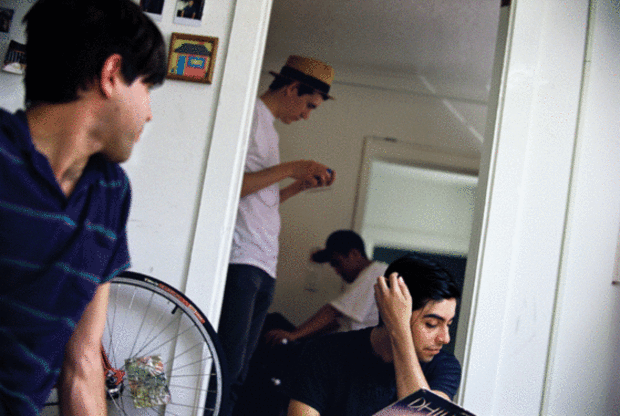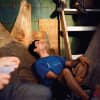Before you check them out live, read Matthew Schnipper's feature story from our Summer Music issue after the jump.
Story Matthew Schnipper
Photography Todd Cole
Just off Avon Park Terrace, walking over a big hill in Elysian Park, I see Abe Vigoda through branches and dust haze, crouched beside a mustard plant. They’re draped in black fabric, filming a video for the song “Skeleton.” They say they are going for a “ritualistic” look, mostly it just looks like they are wearing burqas. Underneath they’re all wearing short shorts and no shirts. Everyone is frowning and sweating. The only water is hot. Guitarist Juan Velasquez is talking about goth. Bassist David Reichardt slept only an hour the night before and isn’t talking at all. Vocalist and guitarist Michael Vidal keeps talking about trying “more concepts.” When their friend Jenna Thornhill, of the band Mika Miko, shows up, we hike down a dirt path carrying a big boombox, yards and yards of purple fabric, a rack tom and a bag of white flour. Velasquez is sure there is a clearing soon, but it never arrives. It is at least ninety-five degrees out and no one is happy.
When they begin filming the ideas don’t come easy and everyone is frustrated but friendly. Drummer Reggie Guerrero’s girlfriend Clare Kelly and Thornhill dance in front of the band while they sit silently in their burqas. It’s like a creepy duck duck goose or a bizarre dance competition. Vidal walks off into the woods shirtless and shoeless with the big piece of purple fabric, covers a fallen tree to build a makeshift hobo hut. The director follows him. Vidal covers his face with flour, lip syncs against a pile of dead trees. He comes back, and everyone else gets flour in their faces. It sticks with the sweat (except to Guerrero, who has surreptitiously maneuvered his hood to entirely block his face). We hike out of the park in the heat, drive back to Vidal’s. They wash up and reassemble.

They’ve all been friends forever. None of them has really played music with anyone else, either. They’ve all gelled solid, symbiotically leaning on each other like whales and barnacles. “I feel like people listen to music for two reasons,” says Vidal. “To dance or to think about the idea of dancing. Or heighten some emotional feeling. Sometimes the best is both at once. Like those old ’90s trance songs like ‘I See Through the Rain.’ That’s the fucking best. That’s kind of what the band is, in this weird way.” Except in no way is that what the band is. They’re so deep in it there’s no seeing the forest for the trees because for them, there is no forest and there are no trees. There is only Abe Vigoda.
After the video shoot, the rest of the day is dazed, a little cranky even, but not mad. “People expect us to make a video where we’re on a beach with sunglasses,” says Velasquez. Today, they’re over being peppy. “Last tour we were all really stressed out about everything and we had a really big outburst over the smallest little thing,” he says. “And after that it was really quiet for a while in the van and then it was like, OK, and then we started talking again.” It’s a working, growing relationship. It’s even a little romantic.
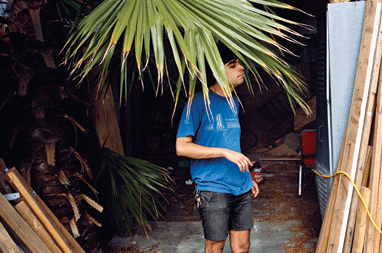
Abe Vigoda started when all four members were in high school in Chino (Velasquez introduced himself to Vidal because he was wearing a Smashing Pumpkins T-shirt). Guerrero learned to play drums in this band; he’d literally never played a kit before their first practice. Until early 2008, by which point they had all moved to LA, they drove Velasquez’s parents’ van to shows from the suburbs to the city and made friends through The Smell. Dean Spunt, of No Age, released their first album, Sky Route/Star Roof, as a vinyl-only record on his label Post Present Medium, and Jim Smith, The Smell’s owner, released their second full length, Kid City, on his label olFactory Records. Despite larger offers, they’ve now returned to Spunt’s PPM to release their new album, Skeleton, amongst friends. “It’s just us working as a family together and trying to do this thing ourselves and make it really work out with no bullshit,” says Vidal.
Their early recordings, particularly Kid City, don’t sound unlike the upcoming album; they’re as happily complex, though less unboundingly pretty. “If you listen to our old records you can hear a slow progression,” says Vidal. You can hear that transition not just from song to song, but within a single song. At the beginning of “World Heart,” from Skeleton, Guerrero only pounds the hi-hat and bass drum four times a bar. Vidal’s voice is recorded so he’s coming over a telephone over the radio. The intro spooks hard for twenty-three seconds and then, after a two-second stairstep tinkle, they basically start playing ska. Guerrero plinks a cowbell pattern and Reichardt plumps the bass fat and round. That lasts for less than thirty seconds until the guitars play static for ten seconds and Vidal half yelps. Then they turn the ska sideways into a pop waltz. Vidal sings slow and tender, One and only little heart, before the song folds calmly. It finishes at one minute, forty-one seconds, the shortest on the album. (Four songs are under two minutes and none are over four.)
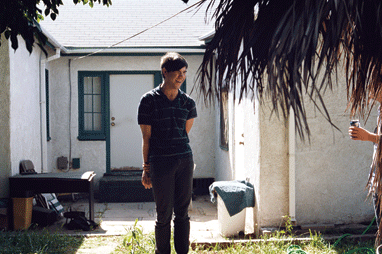
Vidal sings, not yells like he used to, small patches of words like snaggable catchphrases. Now my, now my, now my heart aches, Hope is a white hand that moves through my body and Look in my eyes for I am your brother among them, reflecting an oft-repeated theme of physicality and joy/broken joy. In conversation, Vidal is the kind of person who says the word “beautiful” a lot, whether talking about burritos or technology or his sister. He says it in such a pure, nun-like way it’s difficult to disagree, even when he also seems to be overstating his case. It’s probably not an accident that the last word of the album is “celebration.” And while it might have been a mistake that in the first line of the liner notes’ lyrics there is a fairly glaring grammatical error, both of those things come from the same earnest spirit-place.
When I ask Vidal about his lyrics, he chokes up. Everyone else tries to change the subject, but he stammers along. “It’s a lot about family and friends living life,” he says. “What I want to present as far as feeling, is putting this really dark, deep thing inside on display. It can be really ugly but it can be really great, but it’s totally secret and celebrating and showcasing it as what it is.” This confused, conflicted dynamic is ever-present in their songs, in the mix of circular guitar pop and sullen words, an eternal interweaving of pain and pleasure. It’s necessary and automatic for them to make this music, goofy catharsis through young punk.
Many of Abe Vigoda’s songs sound similar, which I discovered only after listening to Skeleton’s “Animal Ghosts” fifty times before hearing another song. This fact was initially disappointing, but the subtleties bubbled. It’s like the way most Golden Retrievers all look like the same dog, but then when you raise your own you know his specific body nuances: the clipped ear, smooth footpads, tongue with a black spot. There is an individual glimmer within a uniform base. “We constantly write songs,” says Reichardt. “We would all be into one band for a little bit and be like, Let’s write a song kind of like this, and we’d have the inspiration.” An album full of these songs of slow growth and tiny change comes together like an impressionist painting, beautiful in its entirety, but easily lovable as small pastel dots.
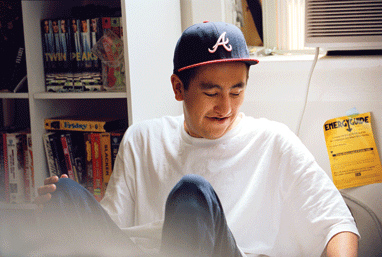
When Guerrero recently broke his wrist skateboarding, the band barely practiced and cancelled most of their shows, including their first trip to South by Southwest. Without that creative energy flowing, they all got a frowny taste of what their lives without Abe Vigoda would be like and “it tasted like metal,” says Guerrero. Towards the end of his healing period, Guerrero decided to play shows drumming one-handed. He couldn’t resist playing with two. “Once I started doing it,” he says, “it motivated me to do all the songs. I was only going to do one or two and then I realized I could do it and I got happy and kept going.”
The weekend I’m in LA is also the weekend of Coachella. The festival comes up in conversation while sitting in Elysian Park eating ice cream and it seems so foreign from anything they have anything to do with, like it would be a punishment to attend. But more than that, it just seems so unspecific. When you are a member of Abe Vigoda, it is your life. “I put school on pause for a little bit to focus on it,” says Velasquez. “It’s stressful with working full time. Working in a record store’s fun and everything, but it’s not my passion to do that. It’s a job. We don’t have any other creative outlet. We don’t draw or anything.” Even as a listener, the music is so similarly enveloping that it’s difficult to want to listen to anything else—or imagine that anyone else would. It’s not myopia, either. It’s the unebbable loose perfection of this band, made stronger by the fact that they feel it too, and they don’t have any idea how or why. When I ask Reichardt why he’s put the rest of his life on hold to play in a band, he simply answers that “it’s fun.” When Velasquez has to go to work while we all hang out, he says he feels like he has “a cast on when you’re all going swimming.” Even though he doesn’t miss much—we just go to a really long barbeque—it’s jarring to their unification.
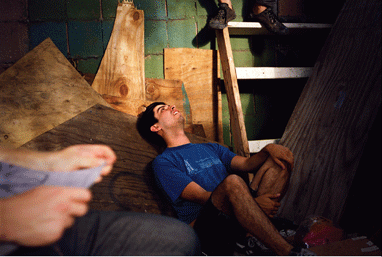
So it’s unsurprising that an explanation of their young magic comes from outside. “I loved being at the practices where you guys made up all the songs for the albums,” says Clare Kelly. She’d sat in on our interviews and spent time with us like she was a member of the band—which, with the exception of playing music with them, she is. That open inclusion and unwithholding care is what constitutes Abe Vigoda: group hugs, actual and musical. “I was at most of the practices in David’s backyard,” Kelly continues, “dancing with the dogs for two hours listening to you guys. It was Chino, it was so suburban, the sunset. Oh, it was amazing. There were roses and dogs and dances. It was perfect. I was in heaven.”
